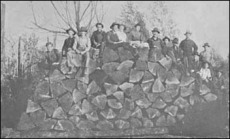 See this Journal Timeline website of local, state, national, international events for years of the pioneer period. See this Journal Timeline website of local, state, national, international events for years of the pioneer period.
 Did you enjoy this story? Remember, as with all our features, this story is a draft and will evolve as we discover more information and photos. This process continues until we eventually compile a book about Northwest history. Can you help? Did you enjoy this story? Remember, as with all our features, this story is a draft and will evolve as we discover more information and photos. This process continues until we eventually compile a book about Northwest history. Can you help?
 Remember; we welcome correction & criticism. Remember; we welcome correction & criticism.
 Please report any broken links or files that do not open and we will send you the correct link. With more than 700 features, we depend on your report. Thank you. Please report any broken links or files that do not open and we will send you the correct link. With more than 700 features, we depend on your report. Thank you.
 Read about how you can order CDs that include our photo features from the first five years of our Subscribers Edition. Perfect for gifts. Read about how you can order CDs that include our photo features from the first five years of our Subscribers Edition. Perfect for gifts.
|
You can click the donation button to contribute to the rising costs of this site. See many examples of how you can aid our project and help us continue for another ten years. You can also subscribe to our optional Subscribers-Paid Journal magazine online, which celebrated its tenth anniversary in September 2010, with exclusive stories, in-depth research and photos that are shared with our subscribers first. You can go here to read the preview edition to see examples of our in-depth research or read how and why to subscribe.
|
|
You can read the history websites about our prime sponsors
Would you like information about how to join them in advertising?
 Our newest sponsor, Plumeria Bay, is based in Birdsview, just a short walk away from the Royal family's famous Stumpranch, and is your source for the finest down comforters, pillows, featherbeds andduvet covers and bed linens. Order directly from their website and learn more about this intriguing local business. Our newest sponsor, Plumeria Bay, is based in Birdsview, just a short walk away from the Royal family's famous Stumpranch, and is your source for the finest down comforters, pillows, featherbeds andduvet covers and bed linens. Order directly from their website and learn more about this intriguing local business.
 Oliver-Hammer Clothes Shop at 817 Metcalf Street in downtown Sedro-Woolley, 90 years continually in business. Oliver-Hammer Clothes Shop at 817 Metcalf Street in downtown Sedro-Woolley, 90 years continually in business.
 Peace and quiet at the Alpine RV Park, just north of Marblemount on Hwy 20, day, week or month, perfect for hunting or fishing Peace and quiet at the Alpine RV Park, just north of Marblemount on Hwy 20, day, week or month, perfect for hunting or fishing
Park your RV or pitch a tent by the Skagit River, just a short drive from Winthrop or Sedro-Woolley — doubling in size for RVs and camping in 2011.
 Joy's Sedro-Woolley Bakery-Cafe at 823 Metcalf Street in downtown Sedro-Woolley. Joy's Sedro-Woolley Bakery-Cafe at 823 Metcalf Street in downtown Sedro-Woolley.
 Check out Sedro-Woolley First section for links to all stories and reasons to shop here first Check out Sedro-Woolley First section for links to all stories and reasons to shop here first
or make this your destination on your visit or vacation.
 Are you looking to buy or sell a historic property, business or residence? Are you looking to buy or sell a historic property, business or residence?
We may be able to assist. Email us for details.
|

 810 Central Ave.,
810 Central Ave., 
